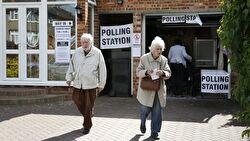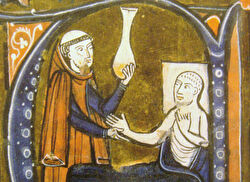
Have you ever thought, ‘This guy is going to hit me’?
I’ve never had this thought while talking to anyone in a television studio. But it has occasionally occurred to me during a barney in someone’s office, after which the cameraman has muttered, “I was sure he was going to punch you.” It hasn’t happened yet. It may have helped that I met and interviewed plenty of guerrillas, terrorist leaders and death-squad commanders before spending much time with politicians, which tended to give a sense of proportion.
But both parties know that a television interview is a performance. To some extent, even a mass murderer will be on his best behaviour when he is aware that a camera is trained on him. This can be intensely frustrating for the interviewer, and as time went by I learnt to match the content of an interview to its duration, the key thing being to get the killer question in early enough for there to be enough time for the interviewee to climb down from the ceiling by the end. If the concluding section was then straightforward or easy-going, sometimes they even forgot how testy things had been earlier. After the camera had stopped running, a question along the lines of “Happy enough?” tended to calm things even more.
Do you still get nervous?
Like some others, when I started broadcasting I was under the impression that I needed to shout, like a preacher at a revivalist meeting. This is a very foolish mistake to make, because however loudly you shout, you will not be heard by the viewer in Hull. The style has to be conversational, albeit a one-way conversation, and you must ignore the other people in the studio. Mostly, they will ignore you, anyway: the best way of telling whether a film or interview on Newsnight was any good was by seeing how many of the studio crew took a break from their screens or newspapers to pay attention to what was being broadcast.
The studio is ruled by red lights, which come on when the output is being transmitted or a camera is “live”. It is, supposedly, the glowing light which induces the nerves. Anxiety is the product of anticipation, so the most nervous-making part of broadcasting — as of most activities — is the expectation. But as time goes by, you get used to the fact that when the red light is on anything you say may be shared with vast numbers of people, so studio twitchiness is reduced. If you felt no nerves at all, you probably wouldn’t be much good at it: anxiety encourages you to make more of an effort.
You probably wouldn’t feel any nerves at all sitting safely in a heap in the middle of an ice rink, but if you want to move, you will have to live with the possibility that you may fall over.
How do you decide who to interview?
The only honest answer to this question is that presenters don’t get to decide who they interview. And nor should they. They’re entitled to express a view about who is to appear, but in the end they should shut up and do as they’re told.
In general, the presenter should express enthusiasm for all projects, and when your producer says, “You’ve got to interview Russell Brand tomorrow,” you should not reply — as I did on the first occasion this was mentioned — “What on earth has he got to say that the world needs to hear?”
Do you tell interviewees the questions in advance?
The answer to this is very simple. No. If you hand over a list of questions, and then merely recite them, you aren’t listening to the answers. On the other hand, anyone who agrees to do an interview without checking what it’s going to be about is a mug
What’s a silly question?
There really aren’t any silly questions — they are either necessary or not. There were many times during Kenneth Clarke’s time as chancellor of the exchequer when asking him about his passion for birdwatching would probably have produced a much more interesting interview than hearing the latest about fiscal policy. Of the several interviews I had with his successor, Alistair Darling, I remember more about my conversation before one of them with his wife, in which we discussed marmalade-making and she passed on some tips for helping me to get mine to set properly.
Having once been invited to join the same fishing party as George Osborne, I would have found discussing why fewer salmon seem to be returning to British rivers a great deal more interesting than hearing a lot of implausible claims about balancing the national books.
But birdwatching, marmalade-making and fishing were not what we were required to discuss. Whatever the subject, it remains true that the best questions are the obvious ones. The more the questioner tries to show off their knowledge, the sillier they seem.
Do you know what you’re talking about?
It is not necessary to be an expert — why bother interviewing someone if you already know it all? The presenter is there merely as the representative of the average, reasonably alert viewer or listener. You only need to know enough not to ask spectacularly stupid questions. That means working on the research, being able to use it, and then to forget it. Today it could be reform of the English school curriculum. Tomorrow it might be the state of the Dominican banana harvest.
Are the people who are interviewed different from the rest of us?
Tony Blair was once at a European Union summit in Holland at which all the heads of government had been invited to an evening reception. Like the other politicians, he worked the room with a grip-and-grin handshake introduction, at ease in his own importance. Thrusting his hand out to a rather older woman, he smiled, “Hello, I’m Tony Blair.”
“And I’m Beatrix,” came the reply.
Before he could stop himself, Blair had asked the Queen of the Netherlands, “And what do you do, Beatrix?”
Very few of the people I interview are troubled by self-doubt. But take away the trappings of office, the staff and outriders, the uniforms or guns, and they are little different from, and often less impressive than, the person who runs the local Scout group or works at the Citizens Advice Bureau.
Quite apart from the capacity for blunders like that of Tony Blair, they may — like Gordon Brown or David Cameron — be visited by awful family tragedy, have embarrassing relatives, find that their bodies let them down or their children don’t care for them. They’re just human beings.
How do you keep your own feelings out of it?
There is a long and not very glorious tradition of senior broadcasting executives claiming that their only concern is to ensure “impartiality”. At its worst, this is one of the dullest ideas on the planet: for every point of view, some opposing position — however badly informed — has to be found. In a strict interpretation, every creationist would have to be matched against an evolutionary biologist, and they have much better things to do with their time. The idea is anyway defined very oddly — no mainstream broadcaster, for example, is impartial about racism. I share the anti-racist prejudice, but fascists have a case when they say that they are treated differently by the media from most other parties.
On the whole it is, I think, more practical to aim to be “fair” than to expect to be “impartial”. Political parties claim to be able to assess “impartiality” by applying stopwatches to the amount of time given to each side of a particular argument. It makes for some very dry broadcasting. Even though “fairness” is a matter of judgment, it is a better yardstick. Obviously, it can only be applied universally if everyone shares the same commitment and is willing to ask themselves, “Am I being fair?” It ought to be possible.
Once you remove personal feelings from broadcasting, you might as well have the job done by machines. For all the cold technology involved, it works only if there is some human transaction taking place between speaker and listener.
“Fairness” is necessarily intuitive, but it makes for better interviews. In an interview one night with the hook-handed former nightclub bouncer and imam “Abu Hamza”, I found myself exclaiming, “If you want to live in some fundamentalist state where they chop people’s hands off and stone women to death, well then, why don’t you go and do so?”
There was a notional question mark at the end of the sentence. But I knew it was a statement of opinion. No one ever rebuked me for it.
What are they really like?
This is as strange a question as “What is a tree like?” A tree is a tree is a tree, whether it is an oak or a beech. Politicians are just human beings, like the rest of us. Some are entertaining, some are dull, some are clever, and some aren’t. One of the silliest comments you ever hear is, “They’re all the same, aren’t they?” No, they are not. They may all play a game that we recognise. But they do not all play it the same way. And some of them don’t like the game very much, anyway. They often like to talk of their trade as “public service”, which puts the best possible gloss on what happens in parliament or the council chamber. It is a noble generalisation, and some of them went into politics for high-minded reasons. Others are charlatans; and the reason still others went into politics is a mystery — they seem to have forgotten it themselves.
What’s with the make-up?
I’ve never worn make-up in civilian life. But the studio lights are bright, and the place can get very hot. Left to their own devices, most people’s faces will assume a sickly pallor and then begin to glisten. When people perspire a lot, they can look decidedly shifty. In my own case — and that of many others — the visit to the make-up chair is pretty fleeting, though it does force three or four minutes of decompression upon you.
Sometimes when sitting there you can learn things, although the baroness who sat down, announced she was wearing no knickers and then gave me her hotel details was slightly more than expected.
The students on University Challenge seem rather to enjoy the whole business — it proves they’re really part of showbiz, I suppose. One who looked at the tub of brushes and creams and said to Jill Stansfield, “Make me beautiful,” may take a different view.
“It’s a brush, love, not a wand,” was the reply.
Do you wear your own clothes on screen?
On news programmes, male presenters are expected to wear a subdued suit, on the theory that it is better that people pay attention to the content than spend their time wondering where on earth that awful jacket came from. News programmes and University Challenge both have a thing about ties: in some antediluvian way they are thought to impart authority, even though they now tend otherwise to be confined to politicians, estate agents and car salesmen.
Is the BBC dominated by political correctness?
Yes. It is sometimes idiotic and sometimes frustrating. But on the whole what is derisively called political correctness is just a wish not to discriminate against people because of who they are, how they look or how they act. What’s wrong with that?
Is the television industry a snakepit?
It is true that parts of it certainly have that reputation. At the time I was on Panorama the programme was especially poisonous, which I attributed to the particular mix of people who were there at the time — as one of the producers put it from deep within his built-up heels, “It is not enough to succeed. Others must be seen to fail.” The programme is still pretty toxic, by all accounts. It comes, I think, from having several teams working on different stories at the same time. When one of them is chosen for broadcast, it means that others aren’t.
But taking the industry as a whole, it seems to me to have no bigger a quotient of unpleasant people than most. In fact, because the majority of those involved are — or ought to be — thinking about serving the public good, it’s probably better than many others. It’s been a great place to spend a working life.
Article courtesy of The Times. Original found here. Image by Mark Harrison.


